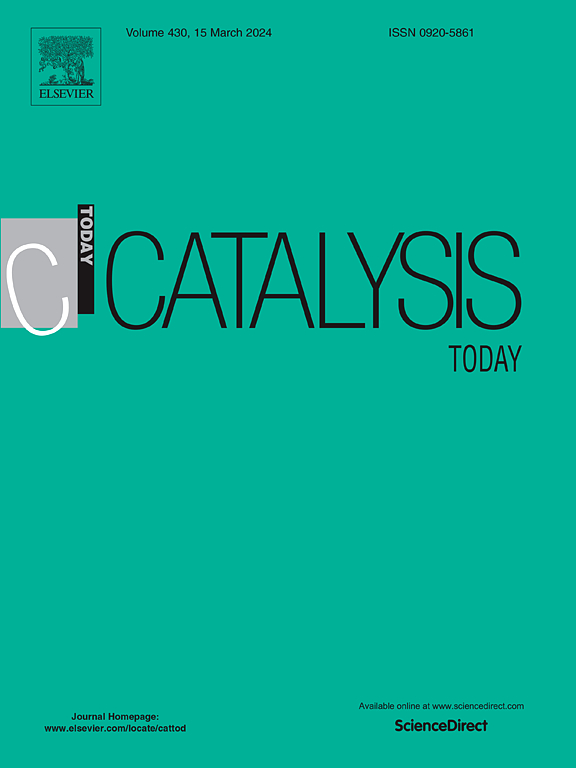IF 5.2
2区 化学
Q1 CHEMISTRY, APPLIED
引用次数: 0
摘要
三羟甲基丙烷脂肪酸三酯(TFATE)作为一种环境友好型生物润滑剂,是矿物基润滑剂的理想替代品。然而,通过酯交换反应合成 TFATE 存在催化剂回收困难和反应速度缓慢的问题。本研究制备了 K2CO3/活性碳催化剂,并将其用于油酸甲酯(MO)与三羟甲基丙烷(TMP)的酯交换反应,以生产 TFATE。对搅拌速度、N2 流量、催化剂用量、催化剂负载量、MO 与 TMP 摩尔比和温度等反应条件进行了优化,获得了最高的 TFATE 选择性 93.7%。为了进一步提高反应速率,采用了微波加热来强化反应过程。动力学研究表明,微波辐照提高了合成 TFATE 的三个连续酯交换反应的速率常数,这主要归因于微波加热的 "热点效应"。此外,K2CO3/AC 催化剂经过五次回收和重复使用,催化剂性能没有发生显著变化。本文章由计算机程序翻译,如有差异,请以英文原文为准。
Transesterification of methyl oleate for biolubricant production over K2CO3/activated carbon catalyst under conventional and microwave heating
Trimethylolpropane fatty acid triester (TFATE) as an environmentally friendly biolubricant is a promising alternative to mineral-based lubricants. However, the synthesis of TFATE by transesterification reaction has the issues of difficult catalyst recovery and slow reaction rate. In this work, K2CO3/activated carbon (AC) catalyst was prepared and used in the transesterification of methyl oleate (MO) with trimethylolpropane (TMP) for TFATE production. Reaction conditions including agitation speed, N2 flow rate, catalyst amount, catalyst loading, MO to TMP molar ratio, and temperature were optimized, with the highest TFATE selectivity of 93.7% obtained. To further increase the reaction rate, microwave heating was employed to intensify the process. The kinetic study demonstrated that the rate constants of the three consecutive transesterification reactions for TFATE synthesis were enhanced by the microwave irradiation, which was mainly attributed to the “hot spot effect” of the microwave heating. Moreover, the K2CO3/AC catalyst was recycled and reused for five times, with no significant change in catalyst performance was observed.
求助全文
通过发布文献求助,成功后即可免费获取论文全文。
去求助
来源期刊

Catalysis Today
化学-工程:化工
CiteScore
11.50
自引率
3.80%
发文量
573
审稿时长
2.9 months
期刊介绍:
Catalysis Today focuses on the rapid publication of original invited papers devoted to currently important topics in catalysis and related subjects. The journal only publishes special issues (Proposing a Catalysis Today Special Issue), each of which is supervised by Guest Editors who recruit individual papers and oversee the peer review process. Catalysis Today offers researchers in the field of catalysis in-depth overviews of topical issues.
Both fundamental and applied aspects of catalysis are covered. Subjects such as catalysis of immobilized organometallic and biocatalytic systems are welcome. Subjects related to catalysis such as experimental techniques, adsorption, process technology, synthesis, in situ characterization, computational, theoretical modeling, imaging and others are included if there is a clear relationship to catalysis.
 求助内容:
求助内容: 应助结果提醒方式:
应助结果提醒方式:


